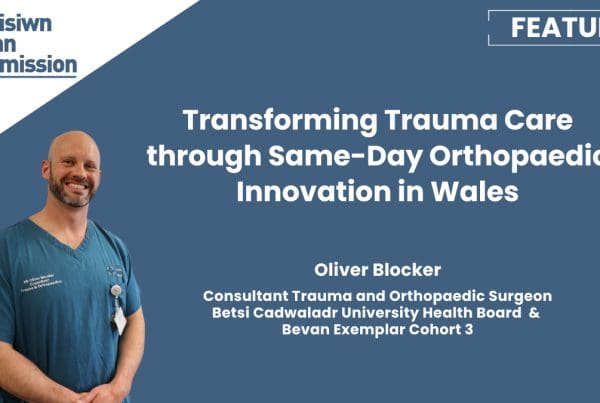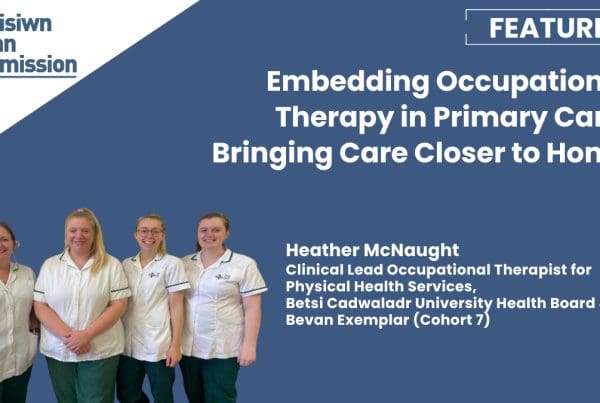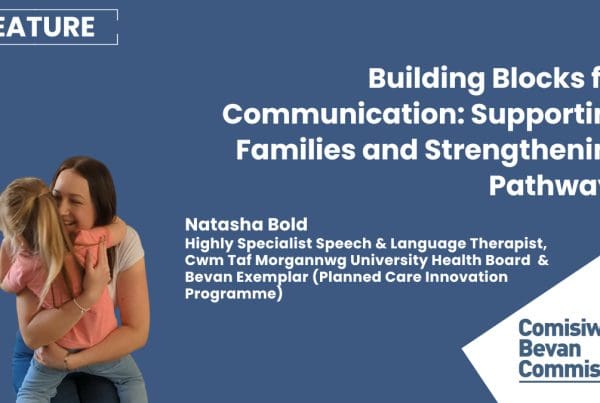As part of the Bevan Exemplar programme, Sarah Beauclerk, Director at Vere Experiences CIC, explored how virtual reality (VR) could support wellbeing, reduce isolation and improve patient outcomes and experience. Working in collaboration with Hywel Dda University Health Board (HDUHB), Pembrokeshire County Counciland others, her projects demonstrated the impact VR can have on patients, families and staff. In this blog, Sarah reflects on the impact, challenges, lessons learned and future potential.
Introducing the projects
The Connecting Realitiesproject was designed to explore how digital and immersive technology could benefit people at risk of isolation. From the outset, VR showed consistent benefits, so this became the core focus.
The VR Inclusive Mental Health Interventions (VRIMHI) project was developed with the Pembrokeshire Older Adult Community Mental Health Team to support older people experiencing low mood. It aimed to lift mood, improve quality of life, and reduce crisis episodes and relapses.
The projects were unusual in being two connected initiatives that were simultaneously Bevan Exemplars, co-led by Sarah through her Community Interest Company. Sarah worked with Michelle Copeman (then Integrated Locality Project Manager, HDUHB) on Connecting Realities, and with Katherine Lewis (Lead for the Pembrokeshire Older Adult Community Mental Health Team) on VRIMHI.
The initial challenge was building a tech infrastructure, combining in-house tools with platforms like ArborXR and Headjack, for customised interfaces, content delivery, and remote headset management. Once resolved, the system proved robust and adaptable. Post-COVID health and safety restrictions added complexity; at one care home, we were the first external visitors.
For VRIMHI, home visits were initially planned, but workforce pressures and unforeseen delays led the team to start with a group event for Mental Health Awareness Week. This proved so effective that it evolved into fortnightly group sessions, still running today. Home visits are offered to those unable to attend.
The Power of the Bevan Exemplar Programme
Being a Bevan Exemplar gave them credibility and opened doors at the health board and county council levels. The amazing mentors, Mark Briggs (Cardiff and Vale University Health Board) and Mark Griffiths (Public Health Wales), offered invaluable support throughout the projects. Sarah is now working closely with Mark Griffiths and the team on the CarerVR project.
Shifting Realities: The Impact So Far
The VRIMHI project continues three years on, a testament to its ongoing success. As one patient said, “If it wasn’t working, it wouldn’t be happening.” The intervention has delivered meaningful benefits for patients, including reductions in relapse and crisis episodes, with one participant describing it as her “safe space.” Evaluation data shows an average in-session mood improvement of nearly 3 points on a 10-point wellbeing rating scale, and a broader trend of sustained improvement in baseline mood. As patients progress and no longer require intensive support, the demand for continued, lighter-touch support has become clear. They are now developing ‘VR Community Mental Health Support Sessions’ in response.
For Connecting Realities, feedback forms co-created with care homes and residents reveal valuable insights. Some care homes report that the visits improved the ambience of the living room, even beyond sessions. Supporters observed mood improvement in 80% of participants. Regular visits helped remove barriers, as experiences become familiar and accessible. Only last week, a VR Supporter, Hardy, reported a ‘miraculous reaction’ when a usually withdrawn resident joined in singing Wonderful World.
The team also work with clinical wards, community care teams, and palliative care to facilitate and support sessions through the coordination of nearly 50 headsets. One community palliative care patient, a lifelong Liverpool FC fan, toured Anfield in VR shortly before passing away – a powerful experience for her and her carer.
In addition, a BMJ Palliative Care blog highlighted how VR benefited people in different, meaningful ways. Staff reported higher job satisfaction and strengthened relationships with patients and residents.
Creative Catalyst funding supported six months of content creation, and the team is participating in a Media Cymru-funded research project with Red Seam Productions and Welsh National Opera – the groups are among the first to trial potential outcomes.
The team has also showcased the projects at events like MediWales and launched CarerVR, at an event introduced by Alison Jones, Public Health Wales. It was later featured in Life Sciences Hub Wales Innovation News, receiving an overwhelmingly positive response.
Spreading the Story: Where It’s Going Next?
VRIMHI is being spread across Hywel Dda University Health Board. Its success is driven by the enthusiasm, capability and tenacity of the Pembrokeshire Older Adult Community Mental Health Team, who deliver sessions with care and originality. They are now mentoring teams in other counties. Sustainability depends on committed local leadership. Mike, who runs the sessions, has been an inspiration.
For Connecting Realities, the team has identified unpaid carers as among the most isolated. In response, and in collaboration with Carer’s Support Pembrokeshire and the Technology Enabled Care Team at Pembrokeshire County Council, the team developed a referral system to loan headsets for home use. Health and care professionals can refer carers to the Technology Enabled Care Team to receive tailored content and support. One core benefit observed is improved sleep, which positively impacts carers’ overall health.
Recognising the need for more practical support, Sarah developed CarerVR with support from Public Health Wales and in collaboration with Pembrokeshire’s OT (particularly OT-innovator Sian Jenkins) and Manual Handling Teams, and Juice Immersive. Their EmbodyCam™ technology allows carers to learn from first-person VR experiences, helping carers build confidence and reduce injury risk. It is now being rolled out in the community, with interest from care homes and plans to pilot VR booths in GP surgeries.
Sarah and her team are working with partners to support the sustainable and seamless integration of VR into clinical and community teams. While progress has been steady, additional resources would help sustain momentum, enabling content creation, tech management, delivery coordination and long-term planning. Evaluation remains a key focus, and the team are working with partners to explore a structured evaluation project to formalise outcomes.
Final Thoughts
Far from being impersonal, virtual reality has opened doors to real human connection, bringing people together, sparking collaboration between teams who rarely meet, and building meaningful relationships. Whilst the vehicle is virtual, the impact is very real.
These projects demonstrate the kind of person-centred, forward-thinking innovation the Bevan Exemplar programme champions. From improving mood and connection for older adults to equipping unpaid carers with practical tools, the projects show how digital solutions can transform lives. Sarah’s advice to future innovators is simple: keep your reason for establishing solutions at the forefront, and take it step by step. By keeping hold of your inspiration, you can overcome challenges and create meaningful change.





